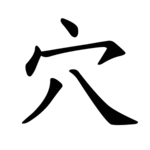Radical 116
 From Wikipedia the free encyclopedia
From Wikipedia the free encyclopedia
| 穴 | ||
|---|---|---|
| ||
| 穴 (U+7A74) "cave" | ||
| Pronunciations | ||
| Pinyin: | xué | |
| Bopomofo: | ㄒㄩㄝˊ | |
| Wade–Giles: | hsüeh2 | |
| Cantonese Yale: | yut6 | |
| Jyutping: | jyut6 | |
| Japanese Kana: | ケツ ketsu (on'yomi) あな ana (kun'yomi) | |
| Sino-Korean: | 혈 hyeol | |
| Names | ||
| Chinese name(s): | 穴寶蓋/穴宝盖 xuébǎogài 穴字頭/穴字头 xuézìtóu | |
| Japanese name(s): | 穴/あな ana 穴冠/あなかんむり anakanmuri | |
| Hangul: | 구멍 gumeong | |
| Stroke order animation | ||
 | ||
Radical 116 or radical cave (穴部) meaning "cave" is one of the 23 Kangxi radicals (214 radicals in total) composed of 5 strokes.
In the Kangxi Dictionary, there are 298 characters (out of 49,030) to be found under this radical.
穴 is also the 117th indexing component in the Table of Indexing Chinese Character Components predominantly adopted by Simplified Chinese dictionaries published in mainland China.
Evolution
[edit]- Large seal script character
- Small seal script character
Derived characters
[edit]| Strokes | Characters |
|---|---|
| +0 | 穴 |
| +1 | 穵 |
| +2 | 究 穷SC (=窮) |
| +3 | 穸 穹 空 穻 |
| +4 | 穼 穽 (=阱 -> 阜) 穾 穿 窀 突 窂 (=牢 -> 牛) 窃SC (=竊) |
| +5 | 窄 窅 窆 窇 窈 窉 窊 窋 窌 窍SC (=竅) 窎SC (=窵) |
| +6 | 窏 窐 窑SC (=窯) 窒 窓JP (=窗) 窔 窕 |
| +7 | 窖 窗 窘 窙 窚 窛 窜SC (=竄) 窝SC (=窩) |
| +8 | 窞 窟 窠 窡 窢 窣 窤 窥SC (=窺) 窦SC (=竇) 窧 |
| +9 | 窨 窩 窪 窫 窬 窭SC (=窶) |
| +10 | 窮 窯 窰 (=窯) 窱 窲 窳 窴 |
| +11 | 窵 窶 窷 窸 窹 窺 窻 (=窗) 窼 窽 |
| +12 | 窾 窿 竀 竁 竂 (=寮 -> 宀) 竃 (=灶 -> 火) |
| +13 | 竄 竅 |
| +14 | 竆 (=窮) |
| +15 | 竇 |
| +16 | 竈 (=灶 -> 火) 竉 |
| +17 | 竊 |
Variant forms
[edit]This radical character takes different forms in different languages. In the Kangxi Dictionary, the first stroke is a vertical dot, and the last stroke of the radical character starts with a short horizontal line when appearing independently (穴), and becomes a vertical-curve-horizontal stroke ㇄ when used as an upper component, with an exception of 空 in which the radical's last stroke starts with a short horizontal line (穴+工). In Japanese and Korean hanja, when used as an upper component, the last stroke of the radical character is a vertical-curve-hook stroke ㇟. In Traditional Chinese used in Taiwan and Hong Kong, its last stroke is a vertical-curve-horizontal stroke ㇄. In Mainland China's xin zixing, it is a rightward dot.
| Traditional Chinese | Simplified Chinese | Japanese | Korean |
|---|---|---|---|
| 穴 空 | 穴 空 | 穴 空 | 穴 空 |
Sinogram
[edit]The radical is also used as an independent Chinese character. It is one of the Kyōiku kanji or Kanji taught in elementary school in Japan.[1] It is a fifth grade kanji.[1]
References
[edit]- ^ a b "The Kyoiku Kanji (教育漢字) - Kanshudo". www.kanshudo.com. Archived from the original on March 24, 2022. Retrieved 2023-05-06.
Literature
[edit]- Fazzioli, Edoardo (1987). Chinese calligraphy : from pictograph to ideogram : the history of 214 essential Chinese/Japanese characters. calligraphy by Rebecca Hon Ko. New York: Abbeville Press. ISBN 0-89659-774-1.
- Lunde, Ken (Jan 5, 2009). "Appendix J: Japanese Character Sets" (PDF). CJKV Information Processing: Chinese, Japanese, Korean & Vietnamese Computing (Second ed.). Sebastopol, Calif.: O'Reilly Media. ISBN 978-0-596-51447-1.

